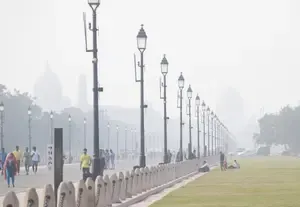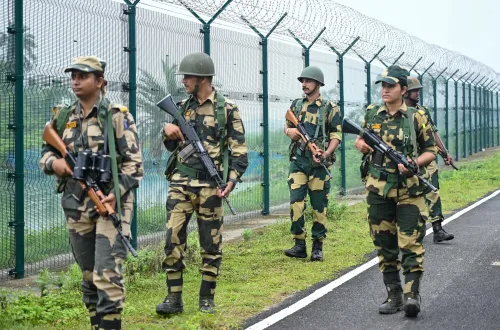Severe Fog Envelops Delhi as Air Quality Dips to 'Very Poor'; Travel Disruptions Reported

New Delhi, Dec 26 (NationPress) The city of Delhi is currently struggling with thick fog, which has drastically reduced visibility across various regions for several days. The air quality in the national capital remains in the 'very poor' category, with the Air Quality Index (AQI) measured at 343 at 6 a.m. on Thursday.
As per the Central Pollution Control Board (CPCB), significant areas such as R.K. Puram (391), Jahangirpuri (375), and Rohini (377) have registered particularly elevated AQI levels. Other noteworthy readings included Vivek Vihar (372), Okhla Phase 2 (369), and Anand Vihar (370).
On Thursday, the dense fog hampered travel, creating challenges for commuters. Flight operations, especially for planes not equipped for low-visibility landings, were disrupted. Airport authorities have encouraged passengers to reach out to airlines for real-time updates and have expressed apologies for any inconvenience caused.
Moreover, around 18 trains departing from the national capital to various destinations across the country faced delays of several hours.
The India Meteorological Department (IMD) has issued a yellow alert, indicating a new western disturbance that is forecasted to bring thunderstorms, rain, and thick fog. A minor decrease in the minimum temperature, by up to 1 degree Celsius, was recorded over the last 24 hours, with temperatures ranging from 20-21 degrees Celsius (maximum) to 8-10 degrees Celsius (minimum).
The IMD anticipates a partly cloudy sky for Thursday, with a possibility of very light rain. Weather predictions for December 27 indicate a predominantly cloudy day, with light to moderate rain, lightning, thunderstorms, and gusty winds likely in Delhi and the NCR region during the evening and night.
Additionally, smog and shallow fog are projected to return in the evening, potentially further reducing visibility as night falls. These conditions are expected to persist throughout the night.
The CPCB's AQI classification spans from 'good' (0-50) to 'severe plus' (above 450), with Delhi's current 'very poor' levels continuing to pose health risks, particularly for vulnerable populations. As winter conditions intensify, monitoring air quality and implementing preventive measures remain vital in the region.
Authorities advise residents to exercise caution and minimize outdoor activities due to the hazardous air quality and adverse weather conditions.










